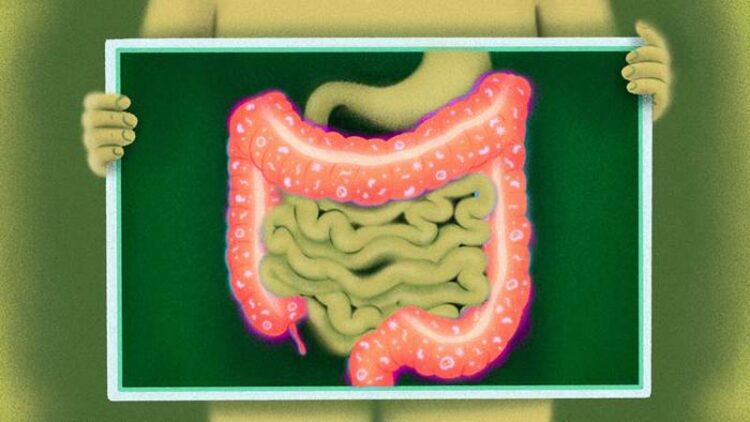Researchers identify why cancer immunotherapy can cause colitis

Studies in mice reveal the mechanism that induces this severe side effect and point to a solution that kills the cancer without causing gastrointestinal issues.
Credit: Michigan Medicine
Studies in mice reveal the mechanism that induces this severe side effect and point to a solution that kills the cancer without causing gastrointestinal issues.
Researchers at the University of Michigan Health Rogel Cancer Center have identified a mechanism that causes severe gastrointestinal problems with immune-based cancer treatment.
They also found a way to deliver immunotherapy’s cancer-killing impact without the unwelcome side effect.
The findings are published in Science.
“This is a good example of how understanding a mechanism helps you to develop an alternative therapy that’s more beneficial. Once we identified the mechanism causing the colitis, we could then develop ways to overcome this problem and prevent colitis while preserving the anti-tumor effect,” said senior study author Gabriel Nunez, M.D., Paul de Kruif Professor of Pathology at Michigan Medicine.
Immunotherapy has emerged as a promising treatment for several types of cancer. But immune checkpoint inhibitors can also cause severe side effects, including colitis, which is inflammation in the digestive tract.
Colitis can cause severe gastrointestinal discomfort, and some patients will discontinue their cancer treatment because of it.
The problem facing researchers was that while patients were developing colitis, the laboratory mice were not. So researchers couldn’t study what was causing this side effect.
To get past this, the Rogel team, led by first author Bernard C. Lo, Ph.D., created a new mouse model, injecting microbiota from wild-caught mice into the traditional mouse model.
In this model, the mice did develop colitis after administration of antibodies used for tumor immunotherapy. Now, researchers could trace back the mechanism to see what was causing this reaction.
In fact, colitis developed because of the composition of the gut microbiota, which caused immune T cells to be hyper-activated while regulatory T cells that put the brakes on T cell activation were deleted in the gut.
This was happening within a specific domain of the immune checkpoint antibodies.
Researchers then removed that domain, which they found still resulted in a strong anti-tumor response but without inducing colitis.
“Previously, there were some data that suggested the presence of certain bacteria correlated with response to therapy. But it was not proven that microbiota were critical to develop colitis. This work for the first time shows that microbiota are essential to develop colitis from immune checkpoint inhibition,” Nunez said.
To follow up what they saw in mice, researchers reanalyzed previously reported data from studies of human cells from patients treated with immune checkpoint antibodies, which reinforced the role of regulatory T cells in inducing colitis.
The antibody they used to stop the colitis was developed by Takeda Pharmaceuticals.
The Rogel team plans additional studies to further understand the mechanisms causing colitis and seeks clinical partners to move this knowledge to a clinical trial.
Additional authors are Ilona Kryczek, Jiali Yu, Linda Vatan, Roberta Caruso, Masanori Matsumoto, Yosuke Sato, Michael H. Shaw, Naohiro Inohara, Yuying Xie, Yu Leo Lei and Weiping Zou.
Funding for this work is from National Institutes of Health grants R01 DK121504, R01 DK095782, R01 DE026728, R01 DE030691, P30 CA046592; Takeda Millennium Pharmaceuticals, Canadian Institutes of Health, Crohn’s and Colitis Foundation, National Science Foundation grant IOS-2107215.
This work was supported by these Rogel Cancer Center Shared Resources: Single Cell Spatial Analysis, Tissue and Molecular Pathology
Paper cited: “Microbiota-dependent activation of CD4+ T cells induces CTLA-4 blockade-associated colitis via Fc-gamma receptors,” Science. DOI: 10.1126/science.adh8342
Journal: Science
DOI: 10.1126/science.adh8342
Method of Research: Experimental study
Subject of Research: Animals
Article Title: Microbiota-dependent activation of CD4+ T cells induces CTLA-4 blockade–associated colitis via Fcγ receptors
Article Publication Date: 4-Jan-2024
COI Statement: N/A
Media Contact
Anna Megdell
Michigan Medicine – University of Michigan
megdella@med.umich.edu
All latest news from the category: Health and Medicine
This subject area encompasses research and studies in the field of human medicine.
Among the wide-ranging list of topics covered here are anesthesiology, anatomy, surgery, human genetics, hygiene and environmental medicine, internal medicine, neurology, pharmacology, physiology, urology and dental medicine.
Newest articles

Red light therapy for repairing spinal cord injury passes milestone
Patients with spinal cord injury (SCI) could benefit from a future treatment to repair nerve connections using red and near-infrared light. The method, invented by scientists at the University of…

Insect research is revolutionized by technology
New technologies can revolutionise insect research and environmental monitoring. By using DNA, images, sounds and flight patterns analysed by AI, it’s possible to gain new insights into the world of…

X-ray satellite XMM-newton sees ‘space clover’ in a new light
Astronomers have discovered enormous circular radio features of unknown origin around some galaxies. Now, new observations of one dubbed the Cloverleaf suggest it was created by clashing groups of galaxies….





















